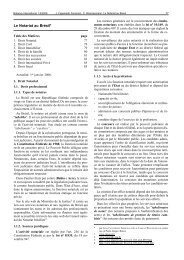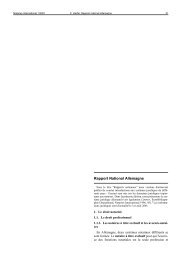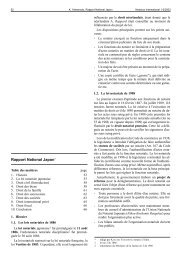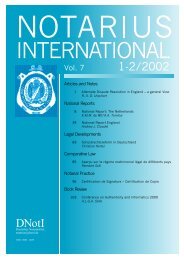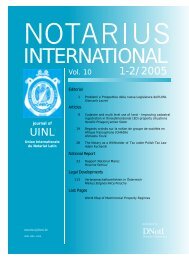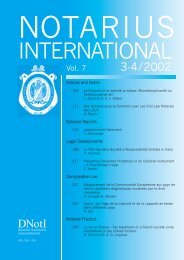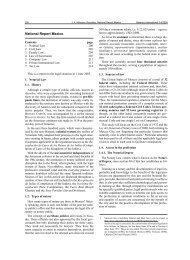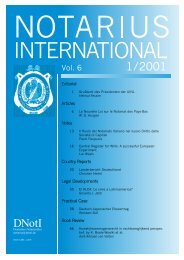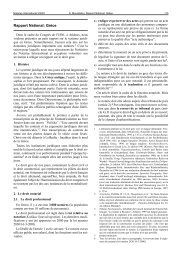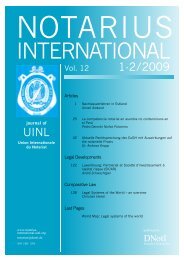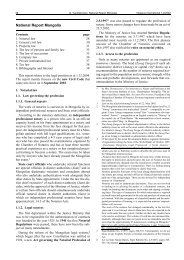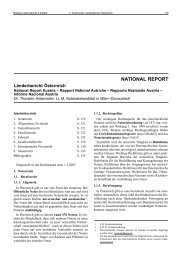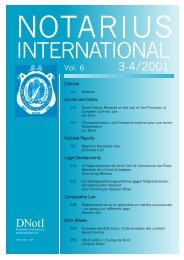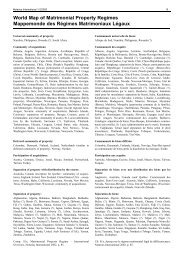You also want an ePaper? Increase the reach of your titles
YUMPU automatically turns print PDFs into web optimized ePapers that Google loves.
280 E. Brancós Núñez, The Right of Withdrawal and Function of the Notary <strong>Notarius</strong> <strong>International</strong> 3-4/<strong>2005</strong><br />
There is also a cooling-off period under German law.<br />
Since 2002, the authentication procedure has included a<br />
fundamental obligation on the notary responsible for<br />
recording a deed: he is obliged to ensure that the legal intentions<br />
of the consumer are expressed in person either<br />
by the consumer himself or by a person whom he trusts<br />
and that the consumer has been afforded sufficient time<br />
to reflect on the content of the deed (Article 17(2)(a) of<br />
the BeurkG). In some consumer contracts the notary fulfils<br />
that duty by communicating the wording of the deed<br />
to the party concerned at least two weeks before the notarisation<br />
date.<br />
In the Netherlands, since 1 September 2003, there has<br />
been a three-day right of withdrawal for a consumer who<br />
signs a preliminary agreement to purchase a dwelling if<br />
that agreement is signed as a private deed rather than in a<br />
contract drawn up by a notary (when there is no right of<br />
withdrawal).<br />
3. The right of withdrawal and unfair terms<br />
One of a notary’s essential functions consists of monitoring<br />
legality. The question that therefore arises here is<br />
whether that function can be adequately replaced by automatic<br />
rules affording protection (partial nullity in the<br />
case of unfair terms, interpretation of unclear terms in a<br />
purchaser’s favour, clauses more favourable to the consumer<br />
carrying more weight in the event of a discrepancy<br />
between general and special conditions etc.) It should<br />
be noted that any clause that is contrary to a binding rule<br />
of law has to be considered unfair. Prima facie, therefore,<br />
the monitoring of legality by a notary would not appear<br />
necessary since clauses that are invalid or that simply result<br />
in an abnormal contractual imbalance to the detriment<br />
of a consumer can always be declared null and void.<br />
The notary’s involvement would not lend any more validity<br />
to an instrument once the consumer protection rules<br />
come into play, notwithstanding that involvement.<br />
It must be said, however, that this is a somewhat simplistic<br />
view of the problem.<br />
Hence, for example:<br />
- There are aspects of the monitoring of legality which<br />
go beyond the relationship between the parties –<br />
such as rules on foreign investments, the evaluation of<br />
capacity and the power of disposal etc.<br />
- Some rules apply because of the contracting parties<br />
themselves rather than because of the agreement, so<br />
that they vary according to who the parties to the contract<br />
might be: for example, rules relating to the economic<br />
regime of a marriage.<br />
- An ex post facto declaration of invalidity of a clause –<br />
or of the whole contract if that clause is a crucial one –<br />
is not the best solution. A subsequent returning of<br />
counter-consideration always presents difficulties – requiring<br />
a judicial decision with all the attendant and inevitable<br />
problems of delay and breach of contract<br />
claims. It involves contentious legal proceedings that<br />
are even more traumatic than a notary’s preventative<br />
solutions affording legal certainty. A solution is not to<br />
be found in legal proceedings but in the means of<br />
avoiding them. The proliferation of consumer arbitration<br />
schemes to lessen the mushrooming of litigation<br />
on consumer matters is clear proof of the inadequacy of<br />
an “automatic scheme” of protection.<br />
In any event, protection against unfair terms is afforded<br />
through the doctrine of partial invalidity and not<br />
through the right of withdrawal. Given that partial invalidity<br />
simply means that the clause does not exist whilst<br />
the rest of the contract subsists, the right of withdrawal is<br />
irrelevant. It cannot protect against a non-existent clause.<br />
4. The right of withdrawal and prior information<br />
Legislation safeguarding the rights of consumers provides<br />
for mandatory information to be necessarily included<br />
in contracts concluded between suppliers and consumers.<br />
It covers material features as well as the content<br />
of rights and obligations binding on the two contracting<br />
parties and particularly includes information on the right<br />
of withdrawal, where applicable, and the circumstances<br />
in which it can be exercised. All countries are in agreement<br />
on this point.<br />
4.1 Sanctions<br />
Failure to include mandatory information has the following<br />
consequences:<br />
- In Austria: in timeshare agreements the period within<br />
which the right of withdrawal has to be exercised does<br />
not begin to run until all of the information is available<br />
(EU directive), with a deadline of three months from<br />
receipt of information on the right of withdrawal.<br />
- in England and Wales: a rescission action within three<br />
months of conclusion of the contract and delivery of<br />
the goods.<br />
- In Germany: the period during which the right of withdrawal<br />
has to be exercised does not begin to run until<br />
the trader or manager has fulfilled his contractual obligations<br />
with regard to information (Article 312(d)(1) of<br />
the BGB).<br />
- In Spain: LATBI (Articles 8 and 9, timeshare agreements)<br />
rescission action within three months. LOCM<br />
(Articles 44-5, distance selling) rescission action within<br />
three months.<br />
Legislation safeguarding consumers has created systems<br />
to make them aware of relevant information with regard<br />
to the objective features of goods as well as the<br />
binding content of the contract. That information has to<br />
be incorporated in the contract. In some countries, such<br />
as Germany and Spain, information contained in advertising<br />
is binding on the supplier even if it is not included<br />
in the contract.<br />
However, there are no systems in existence that can<br />
guarantee that the requisite information is understood.<br />
Nor are there any systems in existence capable of ensuring<br />
that a consumer is told of the fact that certain personal<br />
circumstances applicable to a particular contracting<br />
party could influence the outcome of the contract and<br />
lead to unforeseen consequences. For example: the effects<br />
of the economic regime of a marriage, legislation on



